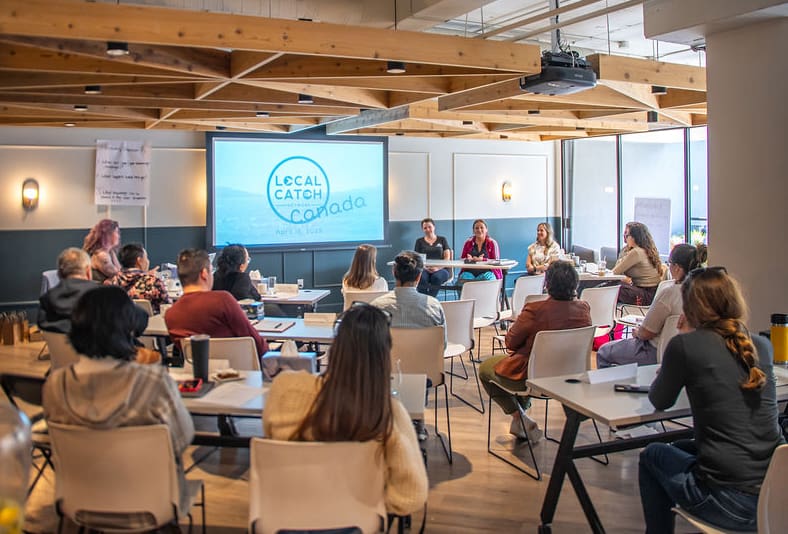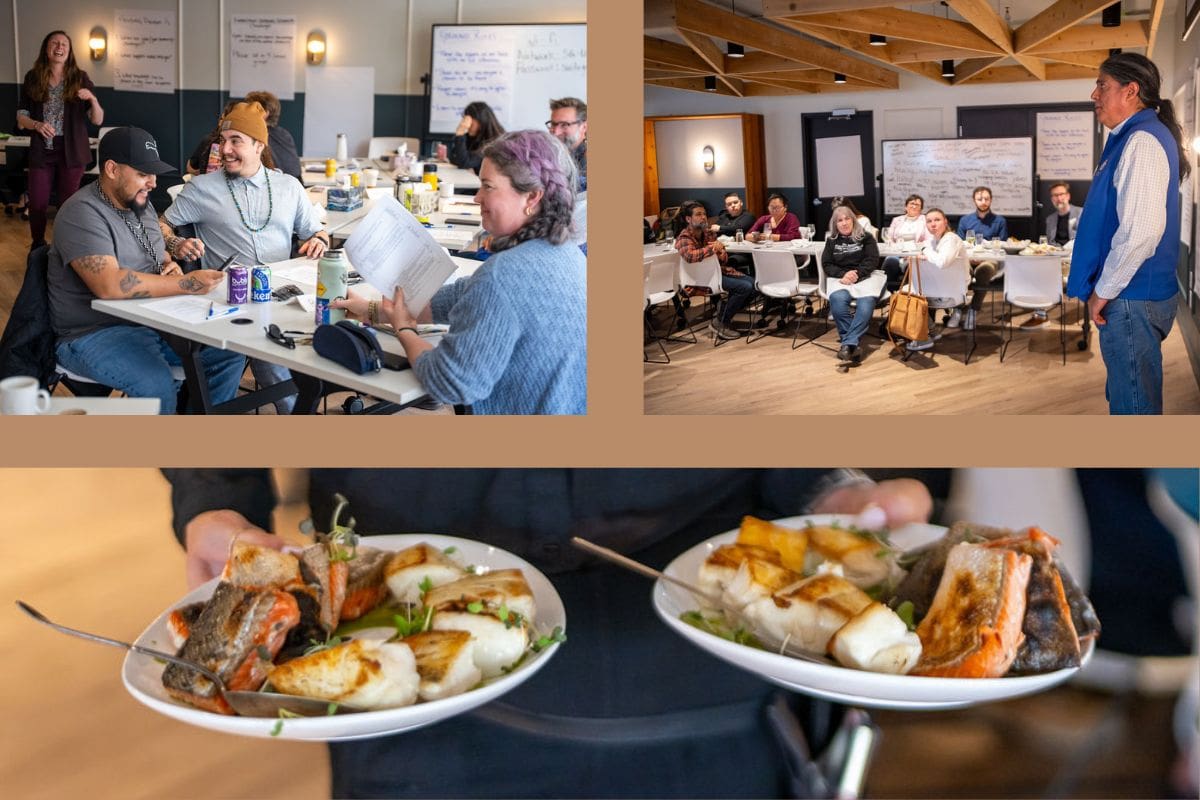Gathering Voices: Building A Shared Future For Fisheries In Canada
NewsDiscover what the first Local Catch Canada Network Retreat signals for the future of Canadian seafood and fisheries.

From April 14th–16th, 2025, the inaugural in-person Local Catch Canada Network Retreat took place on the unceded territories of the Musqueam, Squamish, and Tsleil-Waututh peoples in Vancouver, BC. It marked a milestone in a growing, coast-to-coast movement to transform Canada’s seafood system—one that puts harvesters, communities, and ecosystems at its centre.
Discover more about Local Catch Canada, its connection to Skipper Otto and how being a member of Skipper Otto means being part of something bigger: a visionary effort to build an equitable, community-based seafood system in Canada.
How It Started: Local Catch Canada's Roots in Skipper Otto
Sonia and Shaun Strobel launched Skipper Otto in 2008 as one of the first Community Supported Fisheries in the world; they weren’t just starting a business—they were planting the seeds of a more transparent, values-based seafood system. At the time, few models existed for what this could look like, but the need was clear: fisheries that prioritized people and place over profit.
As Sonia Strobel says, “17 years ago, we asked: why can’t people in Canada get Canadian seafood? Why can’t fishing communities make a living in their traditional way of life? Fast forward to now, and we sure have a detailed answer.”
In 2011, Sonia Strobel joined forces with Dr. Josh Stoll and others working on similar initiatives to form the Local Catch Network—a North American platform for knowledge exchange, innovation, and trust-based seafood systems in support of its vision for “vibrant seafood systems that contribute to the health, prosperity, and sovereignty of fishing communities and the ecosystems upon which they depend.”
As the network evolved, it became clear that Canadian members faced distinct challenges—from different policy landscapes to unique infrastructure needs. In response, Sonia and Dr. Hannah Harrison at Dalhousie University spearheaded Local Catch Canada in 2023 as a Canadian-led initiative focused on strengthening seafood sovereignty, supporting traditional and contemporary fishing livelihoods, and centring Indigenous values and knowledge systems.
As well as being on the Executive Committee of the Local Catch Network, Sonia Strobel is also a member of the Local Catch Canada steering committee, helping to guide the vision and strategy.
Laying the Groundwork: Local Catch Canada's Early Growth
Initially, Local Catch Canada focused on connection—hosting monthly Zoom meetings, creating a web presence, and organizing webinars for their members.
While the network’s roots were virtual, its members knew the importance of gathering in person—to build trust, share knowledge, and strengthen relationships. Finding a time to bring together harvesters from across Canada, from coast to coast to coast, was no small feat. Every region has different fishing seasons, which shift year to year depending on weather and regulatory decisions from the Department of Fisheries and Oceans. In addition, the logistics and costs of bringing folks from Canada's diverse and vast landmass made coordinating an in-person gathering no simple task.
So when a window of time was found in April 2025 that worked for the majority of members, and the Steering Committee, the wheels were in motion for the in-person retreat.
The First Local Catch Canada Retreat: Shared Values, Shared Meals and National Connection
Over three days in Vancouver, approximately 45 harvesters and allies—over half of whom actively work in community-based fisheries and roughly half of whom were Indigenous—came together for the first in-person Local Catch Canada retreat. With no media or government present, the gathering fostered a sense of trust and openness that allowed for candid conversations about what’s working, what’s not, and what needs to change in Canada’s seafood systems.
Participants represented diverse regions and experiences but were united by a shared goal: building a just, community-rooted seafood system. Genuine collaboration between Indigenous and non-Indigenous participants created space for deep listening, mutual learning, and shared leadership.
As Strobel says, “Everyone in the room brought their own historical perspective, cultural perspective, and their own set of deeply held values as well as their own practical, logistical expertise.”
Throughout the retreat, stories of resilience, innovation, and hope flowed—proof that a better system is not only possible but already underway.
Sessions bridged geographic and regulatory divides, revealing the unique challenges and shared strengths of fishing communities nationwide. Breaking down provincial and territorial barriers allowed members to share tools and knowledge, helping fishers and their fisheries become more efficient, more sustainable, and better connected to domestic markets.
Each day was grounded in the tangible culture of sharing seafood. Meals featured Canadian seafood caught by those in the room, and before every meal, time was taken to thank the harvesters, hear the stories behind the seafood, and learn how it was cooked. From Arctic char to Sockeye salmon to scallops, walleye, and Dungeness crab, the meals showcased the diversity (and deliciousness) of Canada’s seafood.
These moments of cultural exchange and shared nourishment deepened the relationships formed throughout the retreat and affirmed a collective commitment to the work ahead.

Photo credit: Josh Neufeld. Clockwise; Image 1: Dr. Hannah Harrison (Dalhousie University), Brendan Langley (Abegweit Conservation Society), Charles Cleal, Bretton Hills (Ondine Ocean Farms). Image 2: Buck Jones (Columbia River Intertribal Fisheries Commission) speaking to group. Image 3: Canadian seafood lunch.
What Comes Next: Momentum and Collective Action
Participants left the retreat inspired and energized, ready to build on the momentum coming out of the retreat. Next steps include pursuing additional funding to support:
- A national listserv for members
- A centralized resource library
- Regular webinars and working groups
As climate change, trade disruptions, and rising food insecurity continue to impact communities, the need for a strong, domestic, community-based seafood system has never been clearer.
For Skipper Otto members, buying fisher-direct seafood isn’t just transactional—it’s participation in a national movement. It’s helping reimagine Canada’s seafood system so it nourishes people, protects ecosystems, and sustains local economies.
Strobel looks back on the evolution of Skipper Otto as a process of trust:
“Our members believed us that first year when we said, ‘Mail us a cheque, and we’ll get you some fish.’ Those first members did—and we’ve been innovating ever since. We’re always asking: How can we do this better? What are the barriers? How can we help? We're changing Canada’s food system because our members and fishers trust us. The more members we have, the more fishers we can support—and the more communities we can reach. Community is driving change.”
Local Catch Canada is proof that this future is within reach—and it starts with connection, collaboration, and community.
